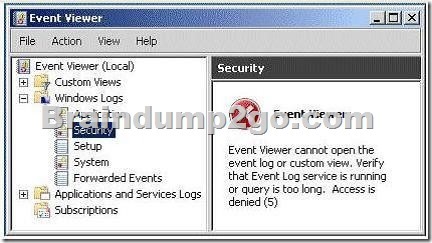2015 New Updated 70-642 Exam Dumps Questions and Answers are all from Microsoft Official Exam Center! Some new questions added into this new released 70-642 Dumps! Download 70-642 Exam Dumps Full Version Now and Pass one time!
Vendor: Microsoft
Exam Code: 70-642
Exam Name: TS: Windows Server 2008 Network Infrastructure, Configurin
Keywords: 70-642 Exam Dumps,70-642 Practice Tests,70-642 Practice Exams,70-642 Exam Questions,70-642 Dumps,70-642 PDF,70-642 VCE,70-642 Study Guide

QUESTION 401
Your network contains a server that has the Network Policy Server (NPS) role service installed.
You plan to configure Network Access Protection (NAP) to use the DHCP enforcement method.
You need to configure a network policy that will apply only to clients that receive an IP address from a specific DHCP scope.
Which condition should you configure?
A. Service Type
B. NAS Port Type
C. Framed Protocol
D. MS-Service Class
E. NAS Identifier
Answer: D
QUESTION 402
Your network contains a server named Server1 that runs Windows Server 2008 R2 Service Pack 1 (SP1).
A user named Admin1 opens Event Viewer on Server1 as shown in the exhibit. (Click the Exhibit button.)
Admin1 can view the events in the Application log and the System log.
You need to ensure that Admin1 can view the events in the Security log.
What should you do?

A. From a command prompt, run net start eventsystem.
B. From the Local Group Policy Editor, modify the User Rights Assignment.
C. From the Local Group Policy Editor, modify the Security Options.
D. From a command prompt, run net start eventlog.
Answer: B
QUESTION 403
Your network contains an Active Directory domain named contoso.com.
All domain controllers and servers run Windows Server 2008 R2 Service Pack 1 (SP1).
All client computers run Windows 7.
A domain controller named dc1.contoso.com hosts an Active Directory-integrated zone for contoso.com.
You have two Web servers named webl.contoso.com and web2.contoso.com.
Both Web servers host the same website.
Webl.contoso.com is located on a subnet named Subnet1.
Web2.contoso.com is located on a subnet named Subnet2.
You create two host (A) records for internal.contoso.com.
One record points to the IP address of webl.contoso.com.
The other record points to the IP address ofweb2.contoso.com.
All users access the website by using the URL http://internal.contoso.com.
You discover that the client computers on Subnet1 always connect to webl.contoso.com and the client computers on Subnet2 always connect to web2.contoso.com.
You need to ensure that all of the client computers are distributed randomly between both Web servers.
What should you do?
A. Disable DNS round robin on dc1.contoso.com.
B. Modify the time-to-live (TTL) value for the A records of internal.contoso.com.
C. Modify the time-to-live (TTL) value for the A records of webl.contoso.com and
web2.contoso.com.
D. Disable netmask ordering on dcl.contoso.com.
Answer: D
QUESTION 404
You have a client computer named Computer1.
Computer1 uses the 172.16.33.105/20 IP address.
You plan to add three client computers to the subnet where Computer1 is located.
You need to identify a valid IP address to assign to the new client computers.
The solution must ensure that the new client computers can communicate with Computer1 by using IPv4.
Which IP address should you identify? (Each correct answer presents part of the solution. Choose three.)
A. 172.16.29.50
B. 172.16.47.209
C. 172.16.50.156
D. 172.16.30.80
E. 172.16.35.12
F. 172.16.49.11
G. 172.16.45.99
H. 172.16.31.222
Answer: BEG
Explanation:
The range of the subnet that the 172.16.33.105/20 IP address is in is 172.16.32.0 to 172.16.47.255.
QUESTION 405
Your network contains a server named Server1 that has the Windows Server Update Services (WSUS) server role installed.
You need to minimize the amount of bandwidth used on the internal network to deploy updates to client computers.
What should you do on the WSUS server?
A. Enable express installation files.
B. Enable Quality of Service (QoS).
C. Disable Quality of Service (QoS).
D. Disable express installation files.
Answer: A
QUESTION 406
Your company has a main office and a branch office.
The main office has a domain controller named MAIN1 that hosts a DNS primary zone.
The branch office has a DNS server named BRANCH1 that hosts a DNS secondary zone.
All client computers are configured to use their local server for DNS resolution.
You change the IP address of an existing server named FILE1 in the main office.
You need to ensure that BRANCH1 reflects the change immediately.
What should you do?
A. Run the dnscmd command by using the /zonerefresh option on MAIN1.
B. set the refresh interval to 10 minutes on the Start of Authority (SOA) record.
C. Restart the DNS Server service on MAIN1.
D. Run the dnscmd command by using the/zonerefresh option on BRANCH1.
Answer: D
QUESTION 407
Your network contains an Active Directory domain named contoso.com.
The network contains three subnets that are separated by firewalls.
The domain contains a server named Servers that has Active Directory Lightweight
Directory Services (AD LDS) installed. Servers only support encrypted LDAP connections.
You need to configure to ensure that client computers can access the LDAP service on Servers.
Which port or ports should you allow through Windows Firewall?
A. TCP 1433
B. UDP 1433
C. TCP 53 and UDP S3
D. TCP 67 and TCP 68
E. UDP 67 and UDP 68
F. TCP 546 and TCP 547
G. UDP 546 and UDP 547
H. TCP 636
I. TCP 995
J. UDP 995
K. TCP 993
L. UDP 993
M. TCP 587 and UDP 587
Answer: H
QUESTION 408
Your company has offices in Montreal, Seattle, and Denver.
The Denver office contains 64 subnets.
The subnets use the network IDs of 172.16.64.0/24 to 172.16.95.0/24.
The Montreal office uses the network IDs of 172.16.96.0/24 to 172.16.127.0/24.
The Seattle office uses the network IDs of 172.32.0.0/24 to 172.16.63.0/24.
You are configuring an Active Directory site for the Denver office.
You need to configure a single Active Directory subnet object to ensure that all of the hosts in the Denver office are recognized as belonging to the Denver site.
The solution must NOT overlap the network IDs assigned to the other offices.
Which network ID should you use?
A. 172.16.64.0/17
B. 172.16.64.0/20
C. 172.16.64.0/18
D. 172.16.64.0/16
E. 172.16.64.0/19
Answer: E
QUESTION 409
Your network contains a server named Server1 that runs Windows Server 2008 R2 Service Pack 1 (SP1).
Server1 has the File Services server role installed.
On Server1, you create a folder named HomeDrive.
All users have a home folder that has the same name as their user account. Each home folder is stored in the HomeDrive folder.
You need to configure file storage rules for Server1 to meet the following requirements:
– Files that are not accessed for 180 days must be deleted.
– All users except for User5 must be prevented from saving audio files and/or video files.
– Only User3, User4, and Users must have a limit of 5,000 MB of disk space in their home folder.
What should you do? (Each correct answer presents part of the solution. Choose three.)
A. Create a file screen and apply the screen to the HomeDrive folder.
B. Create a file screening exception and apply the exception to the HomeDrive folder.
C. Create a quota template and assign a quota derived from the quota template to the
HomeDrive folder.
D. Create a quota template and assign a quota derived from the quota template to the User3,
User4, and Users folders.
E. Create a file management task and apply the task to the HomeDrive folder.
Answer: BDE
Explanation:
http://technet.microsoft.com/en-us/library/cc725711.aspx
http://technet.microsoft.com/en-us/library/cc730822.aspx
http://technet.microsoft.com/en-us/library/dd759227.aspx
QUESTION 410
Your network contains a file server.
The disks on the file server are configured as shown in the table.
You must configure backups for the file server and you must be able to restore individual files.
You need to create a backup of all the volumes.
The solution must minimize the number of backup tasks.
Which two backup tasks should you create? (Each correct answer presents part of the solution. Choose two.)

A. a full server backup
B. a custom backup that contains only volumes C and E
C. a custom backup that contains all of the volumes
D. a custom backup that contains only volumes D and F
E. a custom backup that contains only volume C
F. a custom backup that contains only volumes D, E, and F
Answer: BD
Explanation:
Backup the VHD disks separately.
Note:
– VHD (Virtual Hard Disk) is a file format which represents a virtual hard disk drive (HDD).
It may contain what is found on a physical HDD, such as disk partitions and a file system, which in turn can contain files and folders. It is typically used as the hard disk of a virtual machine.
Braindump2go New Released Premium 70-642 Exam Dumps Guarantee You a 100% Exam Success Or We Promise Full Money Back! Download Microsoft 70-642 Exam Dumps Full Version From Braindump2go Instantly!


